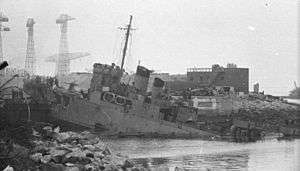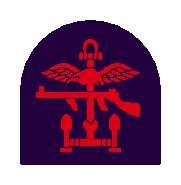David Paton (doctor)
Lieutenant-Colonel David Paton (1912–2008) was medical officer and the last surviving member of the St Nazaire raid of World War II, sometimes called “The Greatest Raid of All.”
Early life and education
David Paton was born at Hamilton, South Lanarkshire, Scotland, on 30 July 1912 and was educated at the Hamilton Academy, a prestigious Scottish school that featured in the Scottish Secondary Teachers’ Association 1950 magazine article series ‘Famous Scottish Schools.’[1] From Hamilton Academy Paton entered the University of Glasgow reading Medicine; at university joining the Officer Training Corps.[2][3]
The War Years
On graduation Paton worked at the Western Infirmary, Glasgow, before being called up to the Royal Army Medical Corps in 1939. After serving at the War Office and several army camps in southern England, he was appointed medical officer to the garrison at Catterick, Yorkshire, England, and just prior to Christmas 1941 was transferred to the Orkney Isles and from there to Ayr where he was seconded to the Commandos.

As medical officer with the Royal Navy and Army Commando unit, under the command of Lord Louis Mountbatten, British Chief of Combined Operations, Paton was part of the daring raid on the dry dock at the occupied French port of St. Nazaire (Operation Chariot) on 28 March 1942. This attack on the dry dock behind enemy lines was an attempt to neutralise the ability of the German battleship Tirpitz to attack Atlantic supply lines to Britain as the dry dock at St. Nazaire was the only dock on the Atlantic coast of occupied France large enough to accommodate the Tirptiz and, as base, would allow the German battleship to attack British shipping supply lines. The 1952 film Gift Horse starring Trevor Howard was based on the true story of the raid on St. Nazaire.

David Paton was to see action again when on D-Day, 6 June 1944, he landed at Sword Beach, Normandy, as second-in-command of 223 Field Ambulance with the Commandos of the 1st Special Service Brigade, under the command of Brigadier Lord Lovat.

Retiring from the Army as a Lieutenant-Colonel, in later years he provided first-hand background information to the Channel 4 2002 television series on the history of the Commandos.[2][4][5]
Retirement
On his retirement from General Practice in Buckinghamshire, England, in 1972, Paton was appointed a police surgeon for the Thames Valley Police Force. He was also president of the Windsor Medical Society and secretary of the Thames Valley division of the British Medical Association, of which he was elected an Honorary Member.
Lieutenant-Colonel Dr. David Paton died aged 95 at Slough, Berkshire, England, on 10 July 2008. [6][7]
References
- ↑ Scottish Secondary Teachers' Association Magazine, February 1950, feature on Hamilton Academy in the article series 'Famous Scottish Schools'
- 1 2 The Independent - Obituary 30 September 2008 Retrieved 5 November 2010
- ↑ Hamilton Advertiser- Obituary 7 August 2008 Retrieved 5 November 2010
- ↑ BBC - People’s War – David Paton article Part I 27 February 2005 Retrieved 5 November 2010
- ↑ BBC People’s War – David Paton article Part II 27 February 2005 Retrieved 5 November 2010
- ↑ "David Paton". The Herald. 6 August 2008. Retrieved 3 October 2016.
- ↑ The Telegraph – Obituary 2 August 2008 Retrieved 5 November 2010